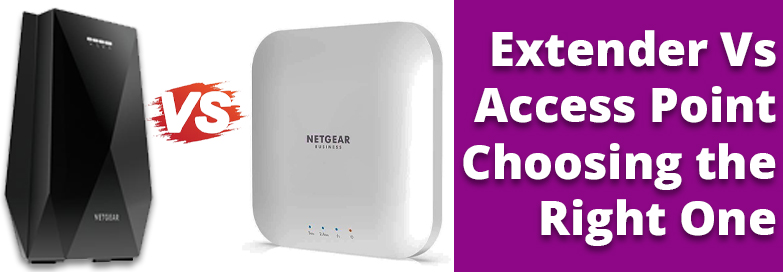The terms WiFi extender and WiFi access point are often confused with each other; however, both devices aren’t the same. It becomes a little tough to decide the best one for you unless you know their exact differences. If you’re confused too, then reading this post on extender vs access point will be beneficial for you. Soon after you are clear about their meanings and differences, you can easily decide which device to go with. Read on and know it for yourself.
Extender Vs Access Point
If you are considering purchasing a networking device to mitigate WiFi latency issues and WiFi dead spots, then you can go for a WiFi extender or access point. Both devices are ideal for getting comprehensive WiFi coverage all over the home. Although the devices may be considered the same, both operate in different ways. Let us tell you how these devices are different from one another. Read on this extender vs access point guide and decide which one you would opt for.
1. Wireless Extender
i. The Working
WiFi extender is also known as wireless range extender. This operates by getting its input signals from the main router. The signals are rebroadcasted past the existing network coverage of the router. This helps to eliminate the WiFi dead zones and the WiFi signals reach the area where the router’s signals can’t reach.
ii. The Connection
The way both these devices connect to the host device is the major difference between them. A WiFi range extender gets connected to the host router in a wireless manner.
iii. The Setup
Setting up a wireless range extender is an easy job. Since there is no cabling required, all you need to do is place the extender next to the router and use the app or web interface to carry out the setup of the extender.
For instance, a Netgear WiFi extender can be set up using the Netgear Nighthawk app or web URL mywifiext.net and following the setup prompts. No expert assistance is needed to complete the installation.
iv. The Placement
The placement of the extender plays a vital role in deciding the quality of the extended network. The WiFi extender needs to be placed halfway between the host router and the area with no WiFi signals. Since the extender gets its input WiFi from the router, it is mandatory that it sits within the boundary line of the router’s range.
v. The Performance
The whole purpose of the wireless extender is to retransmit the WiFi signals from the router. It helps to widen the router’s range. While the resultant signals help you eliminate the dead spots, the network quality can degrade considering the signal is simply getting repeated or extended.
The internet speeds may reduce as the bandwidth is affected when the signal is repeated.
vi. Coverage Area
WiFi extenders are ideal for smaller areas as the signal is simply repeated and the coverage area is not more. This is best suited for homes and individuals. The farther you move from the extender the signal strength keeps decreasing.
Netgear EX8000 WiFi extender boasts of covering up to 2500 sq. ft. and can connect up to 50 devices. The network speed it provides is up to 3000 Mbps.
vii. Cost
The Wireless extender is the cost effective option.
2. Access Point
i. The Working
A WiFi access point (WAP) on the other hand, creates its own WLAN (wireless local area network) by connecting to the gateway or router. The access point turns the wired signals into wireless. The resultant signals are better.
ii. The Connection
An access point makes a wired connection with the main gateway or the host router. An Ethernet cable is typically used to make the connection. A wired connection helps to provide a solid signal from the router to the access point.
iii. The Setup
Setting up an access point can be a cumbersome and time consuming task since it involves a LAN cable to make the connection. Some access points even need professional assistance.
iv. The Placement
An access point uses a wired connection. Hence the placement needs to be well planned. The Ethernet cable should reach both the access point and the router. You may need to run the cable through walls or ceiling to get an internet connection in certain parts. You will need a long cable if you want to increase the coverage area.
v. The Performance
The access point creates its own WLAN thereby acting as a separate hub point or transmitter for the devices to connect. Wired connections are always better and more reliable when compared to wireless connections. Hence the signals that you receive from the access point are more robust, fast and better. The internet speed does not get affected since the bandwidth is not reduced or affected.
Simply put, the access point delivers the same performance as that of the host router.
vi. The Coverage Area
Access points are ideal for large spaces like corporate offices, businesses etc. It is not a good option for individuals.
Netgear WAX630 WiFi 6 access point boasts of covering up to 3500 Sq. ft. area and connecting up to 100 devices. It provides up to 6 Gbps WiFi speeds.
vii. Cost
Access points are not that budget-friendly when compared to WiFi extenders.
Which One is the Best?
We have covered all the factors that’ll help you decide which device suits the best for you. Whether to buy a WiFi extender or an access point, the decision completely depends on your network requirements. Ideal for small areas, WiFi extenders are a budget friendly option. On the other hand, access points are best suited for large coverage areas to get better WiFi signals.
With the hope of providing you with sufficient information here comes an end to this fair extender vs access point comparison guide.

